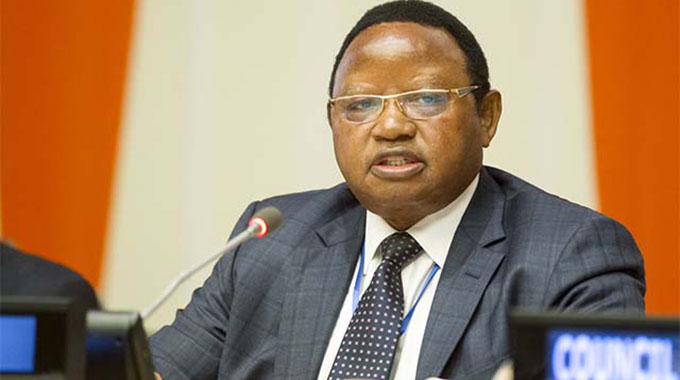Shava markets mining opportunities in Germany

Africa Moyo Deputy News Editor
Foreign investors keen on taking up lucrative investments should consider Zimbabwe with its array of opportunities in key economic sectors such as agriculture, tourism, energy and mining, Foreign Affairs and International Trade Minister Ambassador Frederick Shava said yesterday.
Ambassador Shava is in Frankfurt, Germany, for the first Africa Trade and Investment Conference running from October 12 to 15 and organised by Afrika-Verein, a German business association.
During a panel discussion on Industry 4.0, investing in digitised production and automation, Ambassador Shava said investors should take advantage of improvements made in Zimbabwe’s investment climate and the availability of opportunities in key sectors such as agriculture and mining.
In the mining sector, said Ambassador Shava, Zimbabwe had numerous minerals including lithium, the mineral for the future.
Zimbabwe was also strategically located at “the heart of Southern Africa” and had progressive investment laws that allowed the offering of tax and fiscal incentives, security of investments, 100 percent remittance of profits, disinvestments and dividends.
Zimbabwe had investment opportunities under the public-private partnerships, Special Economic Zones and general investments.
The US$1 billion Manhize steel plant being implemented by global steel giant Tsingshan Holdings through subsidiary Dinson Iron and Steel Company gave Zimbabwe an edge over other countries that were attracting investors.
The steel project is set to become one the biggest in the world, with thousands of direct and indirect jobs created.
Last week, President Mnangagwa commended the Chinese investors for having faith in Zimbabwe while he was commissioning construction works at the steel project.
Ambassador Shava said: “Our best resource is the Zimbabwean people in whom we are investing heavily in educating and training and we have the highest literacy rate in Africa.
“In an increasingly health conscious world, Zimbabwe offers numerous joint venture opportunities in the horticulture sector.
“Zimbabwe has adopted an ease of doing business environment and has opportunities in: mining exploration and value addition, agricultural processing, renewable energy and the services sector.”
Other opportunities exist in infrastructure development, tourism infrastructure and transport covering the region.
Turning to Industry 4.0, Ambassador Shava said like many countries in Africa, Zimbabwe was lagging behind in adopting new technologies.
Companies in Zimbabwe and Africa at large, he said, still relied on antiquated infrastructure and traditional production methods.
The Fourth Industrial Revolution, also known as 4IR, or Industry 4.0, conceptualises rapid change to technology, industries, and societal patterns and processes in the 21st century due to increasing interconnectivity and smart automation.
Due to challenges in accessing cheap lines of credit, owing to sanctions imposed on Zimbabwe, local companies struggled to invest in new production technologies.
The equipment is now prone to breakdowns and gobble a lot of electricity, thereby increasing the cost of production, and in the process make local products uncompetitive on the export market.
Some of the challenges preventing local companies from modernising their operations included inadequate and outdated ICT infrastructure, high cost of ICT services, limited connectivity, skills gaps, energy supply constraints and limited access to trade and investment financing.
“Africa and Zimbabwe in particular still need basic industrialisation,” said Ambassador Shava.
“For Zimbabwe, Industry 4.0 needs to focus on key industries of agriculture, education, mining and the health sector.
“Industry needs to redesign their production processes and operations. There is need to train and retrain the existing workforce and upskill labour to understand and operate new and smart technologies.”
Zimbabwe now had innovation hubs in universities and had modernised education through implementing the Education 5.0 policy anchored on research, training, community services, innovation and industrialisation.
Professor Stefan Liebing, the chairman of the Afrika-Verein der Deutschen Wirtschaft praised Zimbabwe’s timely response to Covid-19 which ensured its impact was not as severe as in other parts of the world.
“Zimbabwe predicted (Covid-19) by implementing the Education 5.0, which overhauled the education system which has impacted the local manufacturing sector and also introduced new measures which ensured that the agricultural sector produces enough grain for the country,” he said.











Comments